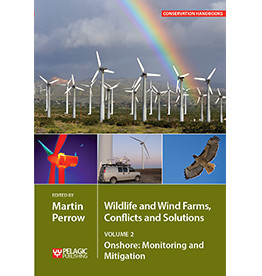| Serie | Conservation Handbooks |
| Auteur | Martin Perrow |
| Taal | Engels |
| ISBN | 9781784271237 |
| Uitgever | Pelagic Publishing |
| Pagina's | 227 |
| Formaat | 17x24,5 cm |
| Bindwijze | Paperback |
| Afbeeldingen | Figuren en tabellen |
| Jaar van uitgave | Mei 2017 |
Wind farms are an essential component of global renewable energy policy and the action to limit the effects of climate change. There is, however, considerable concern over the impacts of wind farms on wildlife, leading to a wide range of research and monitoring studies, a growing body of literature and several international conferences on the topic.
This unique multi-volume work provides a comprehensive overview of the interactions between wind farms and wildlife.
Volume 2 provides a state-of-the-science guide to monitoring and mitigation to minimise or even eliminate impacts on wildlife from wind farms. The survey and monitoring section includes detailed chapters on birds and bats followed by chapters on modelling of collision risk and populations and the statistical principles of fatality monitoring. The following mitigation section comprises chapters on spatial planning and effective mitigation strategies for bats, birds and raptors including through repowering. A synopsis of international best planning and practice concludes the volume.
The authors have been carefully selected from across the globe from the large number of academics, consultants and practitioners now engaged in wind farm studies, for their influential contribution to the science. Edited by Martin Perrow and with contributions by over 30 leading researchers including: Ed Arnett, Cris Hein, Manuela Huso, Johann Köppel, Roel May, Ian Smales & Shawn Smallwood. The authors represent a wide range of organisations and institutions including Bat Conservation International, Birdwatch Ireland, Norwegian Institute for Nature Research, Spanish Council for Scientific Research, Swiss Ornithological Institute, Technische Universität Berlin and US Geological Survey as well as several leading consultancies.
Each chapter includes informative figures, tables, photographs and detailed case studies. Several of the latter are produced stand-alone from invited additional authors to ensure geographic spread and to showcase exciting new research.
This book is designed for practitioners, researchers, managers and for a range of students in higher education, particularly those involved with environmental, ecological, conservation, impact assessment and climate change studies.













